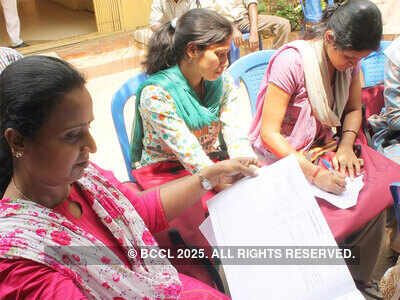Top Searches
- News
- India News
- Hit by Covid-19, Census-NPR may be pushed to next year
Hit by Covid-19, Census-NPR may be pushed to next year

NEW DELHI: As Census houselisting and NPR operations, due to be held during April-September 2020, remain suspended on account of Covid-19, an assessment may need to be taken whether the remaining three month-period after June is an ideal and ample window for all states and Union Territories to start and complete Phase 1 of the decennial exercise or if the entire exercise be rescheduled for April next year.
Census 2021 is to be held in two phases — Phase 1 covering houselisting and housing, to be conducted along with the National Population Register (NPR) exercise, between April and September, followed by population enumeration between February 9 and 28, 2021 with March 1, 2021 as reference date.
While TOI has learnt that government is monitoring the pandemic situation before exploring a revised Census-NPR schedule, some experts including two former Registrars General of India (RGI) & Census Commissioners – A R Nanda and J K Banthia who oversaw 1991 and 2001 Census respectively – are of the view that a reworking of time-lines may be inevitable. In fact, an option they back is deferring the census reference date to March 1, 2022 instead of March 1, 2021, with houselisting in April-September next year and population enumeration in February 2022. “There is a reason why India follows this schedule of conducting population enumeration every 10 years in February as agriculture season, climatic factors, festivals, availability of enumerators and other factors are taken into account and migration is the lowest,” Banthia told TOI.
A government official said census schedules in many countries had either been put on hold, delayed, largely shifted to online means or were being resumed in a phased manner in line with area-specific health and safety norms. “Ideally, census must be held in ‘normal’ year to ensure comparability of data,” said the government official.
“In view of the situation since March until now and Covid-19 cases continuing to rise, rescheduling of Census dates is necessary for maintaining operational sanctity and convenience to ensure the integrity and acceptability of the demographic data, since it is an exercise with huge statutory implications,” said Banthia.
Census 2021 is to be held in two phases — Phase 1 covering houselisting and housing, to be conducted along with the National Population Register (NPR) exercise, between April and September, followed by population enumeration between February 9 and 28, 2021 with March 1, 2021 as reference date.
While TOI has learnt that government is monitoring the pandemic situation before exploring a revised Census-NPR schedule, some experts including two former Registrars General of India (RGI) & Census Commissioners – A R Nanda and J K Banthia who oversaw 1991 and 2001 Census respectively – are of the view that a reworking of time-lines may be inevitable. In fact, an option they back is deferring the census reference date to March 1, 2022 instead of March 1, 2021, with houselisting in April-September next year and population enumeration in February 2022. “There is a reason why India follows this schedule of conducting population enumeration every 10 years in February as agriculture season, climatic factors, festivals, availability of enumerators and other factors are taken into account and migration is the lowest,” Banthia told TOI.
A government official said census schedules in many countries had either been put on hold, delayed, largely shifted to online means or were being resumed in a phased manner in line with area-specific health and safety norms. “Ideally, census must be held in ‘normal’ year to ensure comparability of data,” said the government official.
“In view of the situation since March until now and Covid-19 cases continuing to rise, rescheduling of Census dates is necessary for maintaining operational sanctity and convenience to ensure the integrity and acceptability of the demographic data, since it is an exercise with huge statutory implications,” said Banthia.
FacebookTwitterLinkedinMail
Start a Conversation
end of article
Trending Topics
Quick Links
Coronavirus in MumbaiCoronavirus in KolkataCoronavirus in HyderabadCoronavirus in DelhiCoronavirus in BangaloreCoronavirus symptomsCoronavirus in IndiaWhat is CoronavirusCoronavirus NewsSolar EclipseNPRWhat is NRCCAB BillCAB and NRCRTI BillPodcast newsLok SabhaShiv SenaYSRCPCongressBJP newsUIDAIIndian ArmyISRO newsSupreme Court